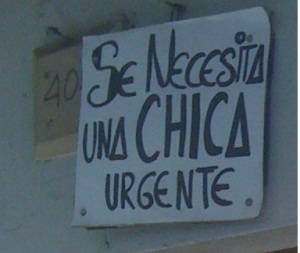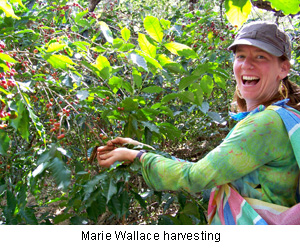 Small banana farmer co-operatives attempting to access international markets are getting dangerously close to their breaking point. The viability – and future – of both these small farmer co-operatives and the independent fair trade importers who struggle to provide consumers with healthy, organic, fair trade bananas is gravely at stake. In fact, if trends continue on their current path, consumers will soon have few brand options available when buying bananas. Roughly eighty percent of bananas are currently sold by only five multi-national banana companies and consumer options will continue to decrease. Farmers will have no choice but to give up ownership and control in their own businesses and return to being mere “suppliers” who sell their products to these same companies for whatever prices the companies dictate.
Small banana farmer co-operatives attempting to access international markets are getting dangerously close to their breaking point. The viability – and future – of both these small farmer co-operatives and the independent fair trade importers who struggle to provide consumers with healthy, organic, fair trade bananas is gravely at stake. In fact, if trends continue on their current path, consumers will soon have few brand options available when buying bananas. Roughly eighty percent of bananas are currently sold by only five multi-national banana companies and consumer options will continue to decrease. Farmers will have no choice but to give up ownership and control in their own businesses and return to being mere “suppliers” who sell their products to these same companies for whatever prices the companies dictate.
Due to a variety of factors, not least being unexpected and severe weather patterns causing severe flooding and droughts throughout Latin America, the supply of organic, Fair Trade, export-quality bananas has dramatically diminished. Consequently, competition for the fruit is severe and several large multi-national fruit companies, such as Dole and Chiquita, are employing a range of strategies to secure supply. With time, money, and other resources on the side of these corporations, small banana farmer co-ops are falling further and further behind.
In northern Peru, where Oke USA/Equal Exchange buys its bananas from two small-scale farmer co-operatives, CEPIBO and APOQ, the stakes are particularly high. As discussed in an earlier post, The True Cost of Bananas, Dole is trying to break the co-operatives by offering farmer- members a price always just slightly higher than that which the co-ops can afford to pay. Our co-op partners tell us that week by week they are reducing costs in order to pay their farmer-members a few cents more per box of bananas: only to learn that Dole has come around the farms matching and raising whatever price the co-op is offering. Although many farmers understand this time-tested strategy that those with money can apply (pay high to break the competition and then when you control the market, pay whatever you like), the economic reality of small farmers often causes them to choose a penny wise and pound foolish strategy.
In the Peruvian newspaper, “La Hora”, an article last month discussed how small-scale producer organizations are protesting the “unfair competition campaign that has been undertaken by large companies that are trying to destabilize the organizations and regain exports that now belong to small-scale, organized producers.” According to Valentín Ruiz Delgado, representative of the Fair Trade Network of Organic Banana Producers of Peru, “we are not opposed to an increase in the price of bananas, but in this case it is an irresponsible strategy (an increase) designed to destabilize small-producer organizations that have recently been gaining headway in the international market,”
“These companies buy bananas at high prices and sell them at low prices, meaning that there is a clear intent to destabilize; they take advantage of the fact that we are relatively young organizations and new to the market, confronting very big companies who make use of their economic power to achieve their objective,” said Ruiz Delgado.
If you would like to know more about how these unfair practices are affecting everyone along the supply chain from the farmer, to you, the consumer, please read the Oke Usa team’s latest edition of Beyond the Peel.






 I often think about how we are changing the world through trade – with relationships and the belief that everyone has rights, no matter where they are from. It’s easy to get overwhelmed by the complex issues spanning the globe, from myriad protests to governmental conflicts to human right abuses. Look at a place like the Democratic Republic of Congo – a war-torn country in Central Africa with a devastated economy and massive sexual violence against women and girls of all ages. Did you know that the D.R. Congo has been called one of the worst places on earth to be a woman? According to a recent
I often think about how we are changing the world through trade – with relationships and the belief that everyone has rights, no matter where they are from. It’s easy to get overwhelmed by the complex issues spanning the globe, from myriad protests to governmental conflicts to human right abuses. Look at a place like the Democratic Republic of Congo – a war-torn country in Central Africa with a devastated economy and massive sexual violence against women and girls of all ages. Did you know that the D.R. Congo has been called one of the worst places on earth to be a woman? According to a recent 






